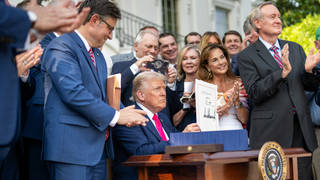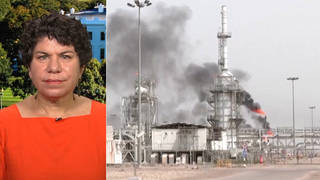
Guests
- Peter Whish-WilsonAustralian senator for Tasmania with the Australian Greens.
A delegation of Australian lawmakers has arrived in Washington, D.C., to urge the Biden administration to halt its prosecution of WikiLeaks founder and Australian citizen Julian Assange. More than 60 members of Australia’s Parliament from across the political spectrum have called for Assange’s release. We speak to Australian Greens Senator Peter Whish-Wilson, who co-founded the Bring Julian Assange Home Parliamentary Group, about the growing Australian movement to free Assange and its implications for U.S.-Australia relations. Whish-Wilson warns that Assange’s extradition to the U.S. to stand trial on espionage charges is “something you would expect from a totalitarian regime” and would set a dangerous precedent for press freedoms around the world.
Transcript
AMY GOODMAN: Colombian President Petro and Brazilian President Lula’s remarks supporting Julian Assange come as a delegation of six Australian lawmakers have arrived in Washington to urge the Biden administration to halt its prosecution of the WikiLeaks founder, who is an Australian citizen. More than 60 members of Australia’s Parliament from across the political spectrum recently wrote an open letter to the Biden administration. It appeared as a full-page ad in The Washington Post.
The lawmakers wrote, quote, “We are resolutely of the view that the prosecution and incarceration of the Australian citizen Julian Assange must end.” The letter goes on to state, “The prolonged pursuit of Mr. Assange wears away at the substantial foundation of regard and respect that Australians have for the justice system of the United States of America,” unquote.
Julian Assange has also received support from the highest levels of the Australian government. This is Australia’s Foreign Minister Penny Wong speaking in July.
SEN. PENNY WONG: We have made clear our view that Mr. Assange’s case has dragged on for too long and our desire that it be brought to a conclusion. And we’ve said that publicly, and you would anticipate that that reflects also the position we articulate in private.
AMY GOODMAN: We’re joined now by the Australian Senator Peter Whish-Wilson. He’s a member of the Australian Greens Party representing Tasmania. He co-founded the Bring Julian Assange Home Parliamentary Group nearly five years ago, just flew in to Washington, D.C., last night.
Senator, welcome to Democracy Now! If you can explain what you plan to do in Washington, D.C., and lay out what you see as Julian Assange’s case?
SEN. PETER WHISH-WILSON: Yeah. Thanks, Amy.
We’ve got a number of meetings with U.S. lawmakers, both in the Congress and in the Senate. We’ll also be meeting with the Department of Justice, the State Department, with the Australian Consulate and ambassador, and a number of other stakeholders, and of course doing media, like I am now.
The primary aim for our delegation, and it is cross-party, is to let Americans know, and particularly those in power, that Australians feel very strongly about this issue. We feel like Julian Assange has suffered enough. He’s been incarcerated now, in one form or another, for nearly a decade for simply publishing the truth. He is an Australian citizen. He won the highest award for journalism in Australia. A number of Australian media outlets, as well as, of course, U.S. media outlets, have published articles around the WikiLeaks disclosures. And we feel that his extradition process that’s underway is a very dangerous global precedent for press freedoms. It’s an extraterritorial overreach by the U.S. government, and not something you would expect from, you know, the beacon of global democracy. With all respect to your listeners, it’s something you might expect from a totalitarian regime. So, the Australian — recent polls in Australia have shown that nine out of 10 Australians would like to see Julian Assange freed. They’d like to see him home for Christmas, to sit down with his lovely wife, his two children, his brother and his father, like all of us, have a Christmas lunch with his family.
And we would like to make it very clear to U.S. lawmakers that the Australian Parliament, who we represent, across political parties, also feel very strongly that if the extradition proceedings continue, and especially if he is extradited to the U.S., increasingly our relationship will be seen through this prism, and one of frustration. I think it’s fair to say that Australia is the closest of friends and the closest of allies with the U.S. And, of course, close friends and allies should have mutual respect. But we don’t feel that the representations our government have made so far to the Biden administration have been listened to. We’ve certainly seen a disappointing response from Secretary Blinken when he was in Australia recently. So we felt like we had to jump on a plane and do 60 hours of travel to be here in Washington to meet face to face and look people in the eye and say, “Enough is enough. Julian needs to be freed.”
JUAN GONZÁLEZ: Well, Senator, I wanted to ask you — when he started this campaign five years ago in the Parliament, you were a lone voice. There were only two of you. Now it’s a quarter of the Australian Parliament. Could you talk about the evolution of the leadership’s view in Australia and of the public’s view in Australia about Julian’s case?
SEN. PETER WHISH-WILSON: Yeah, thank you. Look, it’s a really good question. I met with Julian’s father, John Shipton, nearly five years ago, and he only got two meetings with decision makers in the Australian Parliament, and I was one of them.
I think it’s fair to say that, you know, over the last decade there’s been a very concerted character assassination on Mr. Assange. And I think that there’s a very deliberate strategy here to make him unpopular, because, ultimately, an extradition proceeding, especially on espionage charges, is a political charge. And we see Julian Assange as a political prisoner. But, of course, that would require a political solution to have the extradition proceedings dropped. And if he was unpopular and people didn’t like him, then no one would pay any attention, and the U.S. government would be able to get away with this. So, five years ago, it’s fair to say Julian was unpopular in Australia, too. A number of people didn’t want to engage on this issue.
But as we’ve campaigned to get the facts out there around the specific details of the extradition, which relate to disclosures around the Iraq War, you know, not to disclosures around the Swedish — you know, any attempt for Julian to be sent to Sweden or anything to do with the Cablegate disclosures with the U.S. election — we’ve wanted to just get the facts in front of people, that Julian is an Australian journalist, though is a foreign journalist to your American listeners. It’s the first time that the U.S. government has tried to extradite a foreign journalist for activities on foreign soil. It’s never happened before. And, of course, if a democracy like the U.S. can do this, they can bring a journalist and put them in jail for 175 years — and we don’t believe he will get a fair trial here in the U.S. — what kind of precedent does that set for other nations, if a government doesn’t like what you’ve published and seeks your extradition and seeks to put you in jail to silence you and to make a very — let’s be very clear about this — to make an example of you? And I think, you know, the principle is a very simple one. And as we’ve put these facts in front of people, as we’ve had discussions across parliamentary lines, as we’ve talked to the Australian media, we’ve been able to actually put the details in front of people, and they get it. They understand, when you do that.
So, it has taken some time to build this momentum. I think the documentary about Julian’s father, John Shipton, and his family, his brother Gabriel and others there, the very personalized film about their campaign to get Julian freed, has helped humanize Julian, because, as I’ve said, he’s had a very, very significant hatchet job done on his — you know, he’s been very deeply defamed on a number of levels. And I don’t believe there was any basis to truth on that. So, it’s actually been about changing the frame, to actually look at what is the specific issue of the extradition and what are the global consequences if he is extradited to the U.S.
JUAN GONZÁLEZ: And speaking of changing the frame, next month, your prime minister, Anthony Albanese, is planning an official state visit to the United States and will meet with President Biden. How could Assange’s extradition case potentially influence the discussions in that visit?
SEN. PETER WHISH-WILSON: Well, I think it’s very important that our prime minister does raise this again with U.S. lawmakers, especially with the president. He’s said on — he has raised this both privately, and, of course, it was raised at a press conference in Australia with your secretary of state. And to be honest, it’s one of the reasons we’re here. We want to make sure, as our parliamentary delegation meets with U.S. lawmakers, as we try and raise awareness of this issue amongst your listeners and other people in the United States, that our prime minister feels it is an important issue for them to discuss publicly.
As I said earlier, this is becoming a big issue in Australia. You know, we are the closest of friends. And while friends should be able to disagree, we see the very — especially in recent — in the last 18 months since the Albanese government — our prime minister is Anthony Albanese — the Albanese government has become increasingly closer to the U.S., especially in defense and security ties. The Australian government is looking at appropriating half a trillion dollars to buy nuclear submarines from the U.S., for example. You know, as we’ve become closer to the U.S., we feel there should be some quid pro quo here, given we feel so strongly about this issue of Assange’s release, that that should be the minimum we get back from the Biden government —
AMY GOODMAN: What has the prime minister —
SEN. PETER WHISH-WILSON: — in relation — in contrast.
AMY GOODMAN: Senator, what has the prime minister expressed so far to Biden, either publicly or privately? Is he demanding his freedom or him, after he was extradited to the United States, to be released to Australia?
SEN. PETER WHISH-WILSON: He is, Amy. He said very clearly, similar to what you had there with Senator Wong, our foreign minister — he said he sees no purpose in the continuing incarceration or extradition of Julian Assange. He feels that enough is enough, and it should come to an end. And, you know, I think that’s a very clear message. It is a different message to the last government; the conservative government we had in Australia didn’t say anything about Julian Assange. They didn’t say anything negative about his extradition, but at the same time they never made any public statements.
So we have seen a sea change or a seismic shift in our leadership commenting on this issue, which we welcome. But we would like to see this backed up by action. You know, words are cheap. We would like to actually see the prime minister lay out to the U.S. president and other power structures here within the U.S. that there will be consequences if Julian Assange is extradited. We feel that’s very important, to be very clear as friends —
AMY GOODMAN: We have 10 seconds.
SEN. PETER WHISH-WILSON: — and have a very frank discussion.
AMY GOODMAN: Peter Whish-Wilson, I want to thank you for being with us, has been an Australian Greens senator from Tasmania in the Australian Federal Parliament since 2012. He co-founded the Bring Julian Assange Home Parliamentary Group nearly five years ago.
Next up, we speak with Indigenous leader Winona LaDuke. A Minnesota judge has thrown out criminal charges against her and two other water defenders arrested for protesting at the construction site of Enbridge’s Line 3 pipeline. Back in 30 seconds.












Media Options